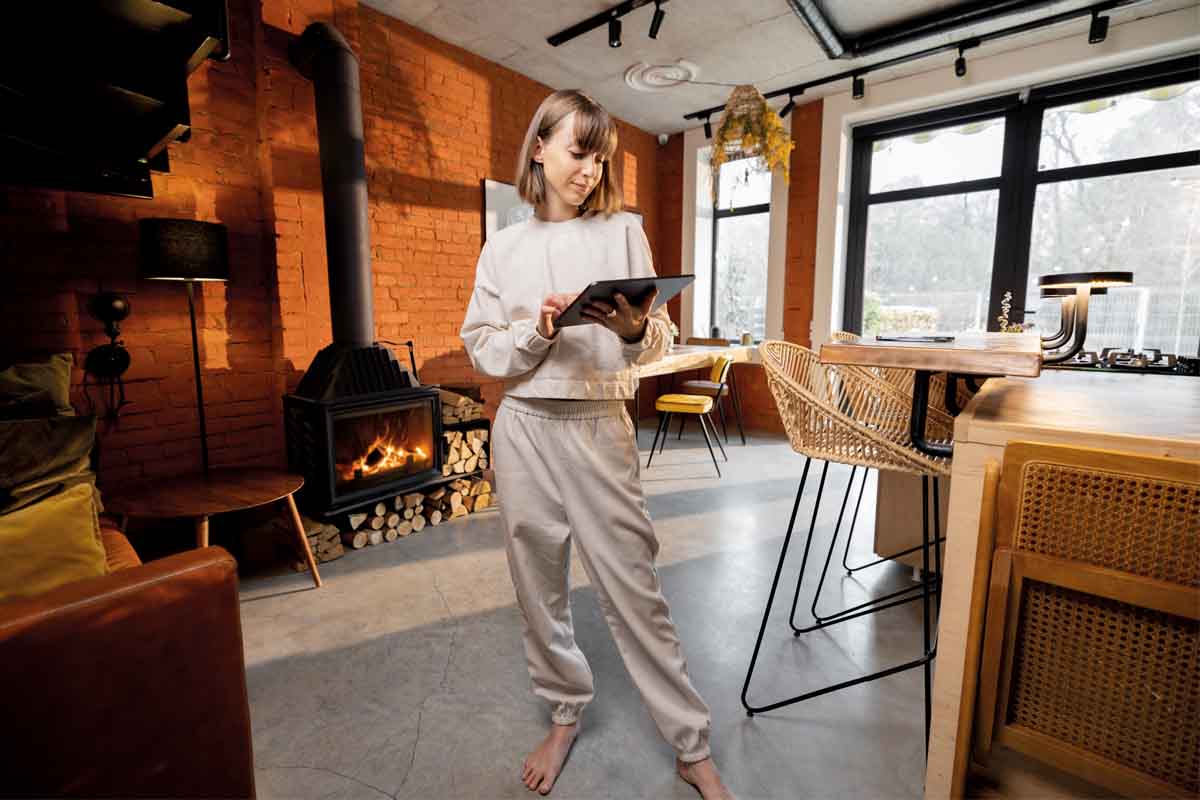
Smart tech can usher in sweeter sleeps and cleaner air, transforming your home into a health ally overnight. Here are research-backed ways to seamlessly embed it into your routine.
Dim down, power up: lighting for everything
Lighting is no small thing. It’s a powerful and straightforward way to shape your mood, sleep, and hormones—for better or for worse.
For instance, too much light at night scrambles your circadian rhythm, the body’s internal clock. Bright lights before bed delay your peak of melatonin, also known as the “sleep hormone,” hindering your ability to fall, and stay, asleep.
This is where smart lights can be useful, automatically optimizing your lighting based on the time of day. As night falls, they can regulate your body’s natural sleep-wake cycle by dimming your lighting to stimulate melatonin. Smart lights can even gently ease you into the day, simulating a sunrise that naturally awakens you.
Starting your day with morning light is essential, because it ramps up your cortisol. While you may know it as the stress hormone, a morning spike of cortisol helps your energy, immune system, metabolism, and ability to focus throughout the day. Outdoor light is always best, but evidence suggests that smart sun lamps (or SAD lamps) mimicking daylight can help too.
Don’t let the blue light win
Blue light seriously messes with your sleep. The gold standard is to put your phone away two to three hours before bed, cutting it out entirely. The second best option is to use your smartphone’s “night mode,” which will lower your exposure, though not eliminate it.
Clear the air, calm the body
Air pollution is the fifth-leading risk factor for death, worldwide. A high-efficiency particulate air (HEPA) filter may be an effective way to purify the air in your home from harmful exposures. A 2018 study on older adults living in Detroit found portable HEPA purifiers reduced their exposure to these pollutants while even lowering their blood pressure. Another study found that HEPA air purifiers could decrease inflammation in patients with stable coronary heart disease.
High-tech hacks for low-effort meals
Air fryers can be a wise swap for deep fryers, as they use just a tablespoon of oil rather than cups—potentially cutting calories by up to 80 percent during the cooking process. While calories are anything but the be-all-end-all when it comes to a healthier diet, for those looking to decrease oil consumption, air fryers can be a quick fix.
Air fryers can even cut down on the effects of polycyclic aromatic hydrocarbons (PAHs) and acrylamides, which are carcinogens produced at high temperatures. It’s worth noting that PAHs and acrylamides can still form during air frying, just at a much lower level than in deep frying, largely due to reduced oil use.,
Air fryers are a smart tech choice since they can get dinner on the table faster than an oven would, potentially preventing you from defaulting to takeout if you’re yearning for a quick bite. Similarly, smart ovens let you preheat from your phone so they’re piping hot the moment you get home.
Tracking your way to better dreams
Better sleep is notoriously hard to crack. There are heaps of tips and tricks out there for how to get a better slumber. But personalized tools like smart rings and watches offer a customized edge.
Both can track your sleep stages, so that you know whether you’re truly resting. They can even monitor recovery, guiding your decision to either forge ahead with today’s workout or just take it easy.
A survey by the American Academy of Sleep Medicine found over three‑quarters of users found trackers helpful—and nearly seven in 10 adjusted their behavior after seeing their sleep data. And ultimately, that’s the number one thing to look for with smart tech: gadgets that will change your habits, not just add to the power bill.
The essentials of essential oils
Essential oils are another way to transform your air:
- Diffusion of citrus lemon and silver fir (Abies alba) oils may help reduce airborne bacteria and fungi in the kitchen.
- Lavender may enhance “slow wave” sleeping (a known indicator of good sleep quality), making it a great fit for the bedroom.
- A peppermint diffuser outdoors may help keep the flies away while also boosting your alertness and memory.
Remember, essential oils aren’t a cure-all. Some research has found links to cardiopulmonary health, so ensure you’re not prolonging your exposure to higher concentrations than are deemed safe. Pets are more sensitive to essential oils than humans, so check that your choices are safe for them too.
This article originally appeared on alive.com as “Tech That Takes Care of You and Your Home.”